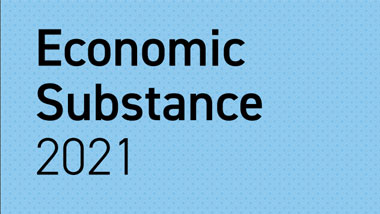Opalesque Roundtable Series ’22 Bahamas
Alexander M. B. Christie, Partner, leading the Firm in this area, contributed as one of the Speakers at the 2022 Opalesque Roundtable Bahamas edition discussing The Bahamas’ Pioneering Legal Groundwork for Digital Assets Industry. Roundtable topics included discussions on the Central Bank digital currency of The Sand Dollar; The Bahamas’ history of innovation in its legislation and regulations; the government issued White Paper on the Future of Digital Assets in The Bahamas; and The Bahamas’ present and future positioning in the global FinTech marketplace. Don’t miss the opportunity to partake in Alexander’s and follow speakers’ thoughtful insight on these exciting and encouraging movements in the Bahamian Fintech Industry!
Download pdf
International Insolvency & Restructuring Report 2022/23
Recently the Supreme Court of the Commonwealth of The Bahamas handed down a comprehensive Ruling on the issue of costs in liquidation proceedings – In the Matter of Rural International Bank Limited – 2013/COM/bnk/0088. This helpful decision clarifies the position relating to the taxation of costs in insolvency proceedings in The Bahamas, the entitlement to costs of the attorney of the Liquidation Committee and the treatment of Calderbank offers within the context of insolvency proceedings.
Download pdf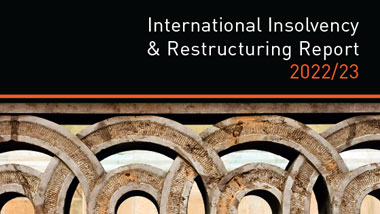
Currency Evolves in The Bahamas – a Story of Innovation
All financial jurisdictions must evolve or die. The world is changing swiftly and it is almost essential for anyone who wants to keep up with the times to use digital currencies. Central banks around the world are experimenting with various forms of digital currency and The Bahamas is no exception.
Download pdf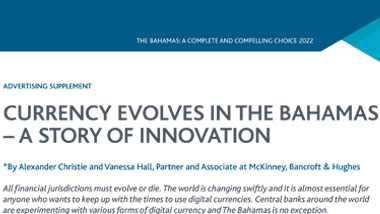
The Long and Winding Trust
In Ashley Dawson-Damer v Grampian Trust Company Limited & Lyndhurst Limited (the Action), Dawson‑Damer (the Plaintiff ), a discretionary beneficiary of a Bahamian trust, challenged appointments made in 2006 and 2009 on the basis that the trustee made the said appointments without sufficiently considering the Plaintiff ’s needs, circumstances and interests. The relief sought by the Plaintiff was not a claim for damages but rather the setting aside of the two aforementioned appointments and for the removal of the trustee.
Download pdf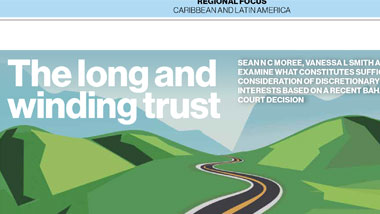
Litigation 2022 – The Bahamas – Updated December 02, 2021
Law and Practice
1. General
1.1 General Characteristics of the Legal System
The Bahamian legal system is based on the English common law, supplemented by legislation promulgated by the parliament of the Commonwealth of The Bahamas. Court proceedings in The Bahamas are conducted through an adversarial system of civil procedure. Legal arguments are made by a combination of oral and written submissions.
Click the following link to view the full article: https://practiceguides.chambers.com/practice-guides/litigation-2022/the-bahamas
To access the PDF, click the button below.
Download pdf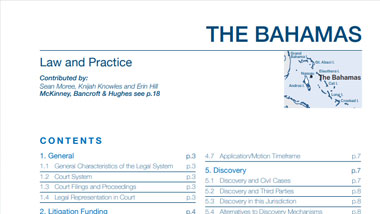
The International Insolvency & Restructuring Review 2021/22
KEY DEVELOPMENTS & THE LATEST TRENDS IN THE BAHAMAS – FROM A LEGAL PERSPECTIVE
The insolvency legislation in The Bahamas
In 2011 and 2012 the insolvency legislation in The Bahamas was completely revamped by the enactment of the following Act and Rules:
(i) The Companies (Winding Up Amendment) Act, 2011;
(ii) The International Business Companies (Winding Up Amendment) Act, 2011;
(iii) The Companies Liquidation Rules, 2012 (the “CLR”);
(iv) The Insolvency Practitioners’ Rules, 2012; and (v) The Foreign Proceedings (International Cooperation) Liquidation Rules, 2012.The procedure for the liquidation of companies incorporated under the Companies Act of 1992 (as amended by the Companies (Winding Up Amendment) Act, 2011, the “Companies Act”) and under the International Business Companies Act of 2000 (the “IBC Act”) is now almost identical in that section 89 of the IBC Act (as amended) states that “[a] company incorporated under this Act may be wound up under any of the circumstances, insofar as they are applicable to a company incorporated under this Act, in which a company incorporated under the Companies Act, Ch. 308 may be wound up and subject to the provisions of this Part the provisions of the
Companies Act relating to winding up and dissolution shall apply
mutatis mutandis to the winding up and dissolution of the company”.
Accordingly, the CLR apply to both types of company.
Please see the attached link to view the full article.
Download pdf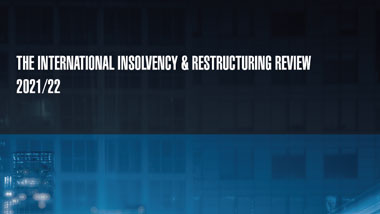
Law & Practice and Trends & Developments – Chambers Insolvency 2021 Guide
Insolvency 2021 – The Bahamas
The Bahamian economy is slowly recovering from the dual calamity of the devastating Hurricane Dorian, which made landfall in The Bahamas in September 2019, and the COVID-19 pandemic. The first confirmed case of COVID-19 in The Bahamas was in March 2020.
Read the full article here: https://practiceguides.chambers.com/practice-guides/insolvency-2021/the-bahamas

Locus Standi – An Article by Timothy A Eneas
ADVERSE CLAIMANT LOCUS STANDI IN QUIETING TITLES ACTIONS – By Timothy A. Eneas – McKinney, Bancroft & Hughes
It has been suggested that few Bahamian statutes have given rise to more jurisprudence than the Quieting Titles Act, 1959 (“the QTA”). Proceedings under the QTA are conducted in the nature of a judicial inquiry, often involving multiple parties. In the context of a contested petition, it is not unusual for the proceedings to be ongoing for years. As a consequence of the established duty of the court to conduct a full investigation, it is customary for Supreme Court judges to adopt a lenient approach to the filing and recognition of adverse claims. This is no doubt due in part to the absence of any specific legislative guidance on the standing required of an adverse claimant. Furthermore, there is a dearth of legal authority on the requirements which must be satisfied by an adverse claimant in order to establish sufficient locus standi to participate in a quieting titles action. It is posited that this deficiency has in many cases contributed to what often results in lengthy and costly court proceedings.
Supplemental Links:
Judgment – Charles J – Locus Standi – In the Petition of Scott E. Findeisen and Brandon S. Findeisen (as Trustees of the Stephen A. Orlando Revocable Trust)

The PERSONAL INJURY Claim
What is a personal injury claim?
• A personal injury claim is a legal claim in civil law for compensation by a person who has been injured, usually in an accident, wholly or partly as a result of the fault of someone else. Personal injury includes physical and psychological injury to a person.
• The compensation claimed usually includes damages, interest and legal costs. Often the compensation will be paid by the wrongdoer’s insurance company.
• The person who has been injured is referred to as the claimant or plaintiff while the wrongdoer is referred to as the respondent or defendant.
To learn more about our Litigation Practice, please go to our Litigation and Dispute Resolution page and to learn more or contact the author, please see Genell K. Sands’ attorney page.
Download pdf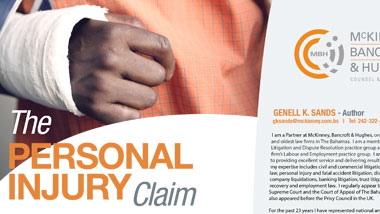
Economic Substance 2021
The legislation that sets out the economic substance requirements in The Bahamas is the Commercial Entities (Substance Requirements) Act 2018 (CESRA). CESRA came into force on 31 December 2018.
Download pdf